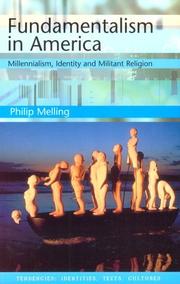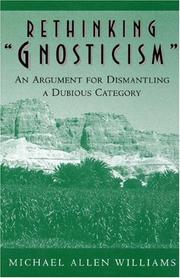| Listing 1 - 3 of 3 |
Sort by
|
Book
ISBN: 9021137577 Year: 1999 Publisher: Zoetermeer Meinema
Abstract | Keywords | Export | Availability | Bookmark
 Loading...
Loading...Choose an application
- Reference Manager
- EndNote
- RefWorks (Direct export to RefWorks)
Fundamentalism --- capuccinia --- Christian fundamentalism --- Protestant fundamentalism --- Religious fundamentalism (Protestantism) --- Protestantism --- Theology, Doctrinal --- Evangelicalism --- Millennialism --- Modernist-fundamentalist controversy --- History --- Religious studies

ISBN: 0748609784 Year: 1999 Volume: *1 Publisher: Edinburgh Edinburgh university press
Abstract | Keywords | Export | Availability | Bookmark
 Loading...
Loading...Choose an application
- Reference Manager
- EndNote
- RefWorks (Direct export to RefWorks)
Christianity and culture --- -Fundamentalism --- -Religion in literature --- Religious fundamentalism --- -#KVHA:Godsdienst; Verenigde Staten --- #KVHA:Fundamentalisme; Verenigde Staten --- #KVHA:American Studies --- Fundamentalism, Religious --- Fundamentalist movements, Religious --- Religion --- Religion in drama --- Religion in poetry --- Christian fundamentalism --- Protestant fundamentalism --- Religious fundamentalism (Protestantism) --- Protestantism --- Theology, Doctrinal --- Evangelicalism --- Millennialism --- Modernist-fundamentalist controversy --- Contextualization (Christian theology) --- Culture and Christianity --- Inculturation (Christian theology) --- Indigenization (Christian theology) --- Culture --- History --- United States --- -Church history --- Fundamentalism --- Religion in literature --- #KVHA:Godsdienst; Verenigde Staten --- Church history. --- religious fundamentalism --- America --- identity --- militant religion --- paranoia --- xenophobia --- evnagelicalism --- postmodernity --- politics --- race --- scripture

ISBN: 0691005427 0691011273 1400822211 1282753193 9786612753190 1400813832 9781400822218 1400808537 9780691011271 Year: 1999 Publisher: Princeton, NJ
Abstract | Keywords | Export | Availability | Bookmark
 Loading...
Loading...Choose an application
- Reference Manager
- EndNote
- RefWorks (Direct export to RefWorks)
Most anyone interested in such topics as creation mythology, Jungian theory, or the idea of "secret teachings" in ancient Judaism and Christianity has found "gnosticism" compelling. Yet the term "gnosticism," which often connotes a single rebellious movement against the prevailing religions of late antiquity, gives the false impression of a monolithic religious phenomenon. Here Michael Williams challenges the validity of the widely invoked category of ancient "gnosticism" and the ways it has been described. Presenting such famous writings and movements as the Apocryphon of John and Valentinian Christianity, Williams uncovers the similarities and differences among some major traditions widely categorized as gnostic. He provides an eloquent, systematic argument for a more accurate way to discuss these interpretive approaches. The modern construct "gnosticism" is not justified by any ancient self-definition, and many of the most commonly cited religious features that supposedly define gnosticism phenomenologically turn out to be questionable. Exploring the sample sets of "gnostic" teachings, Williams refutes generalizations concerning asceticism and libertinism, attitudes toward the body and the created world, and alleged features of protest, parasitism, and elitism. He sketches a fresh model for understanding ancient innovations on more "mainstream" Judaism and Christianity, a model that is informed by modern research on dynamics in new religious movements and is freed from the false stereotypes from which the category "gnosticism" has been constructed.
Gnosticism. --- Rome --- Religion. --- Gnosticism --- 273.1 --- 273.1 Gnosis. Gnosticisme --- Gnosis. Gnosticisme --- Religion --- Cults --- Rome - Religion --- Against the Galilaeans. --- Agrippa Castor. --- Anchorite. --- Anthropomorphism. --- Anti-Judaism. --- Antinomianism. --- Antipope. --- Apocalypse. --- Apocrypha. --- Apocryphon. --- Apostasy. --- Asceticism. --- Blasphemy. --- Borborites. --- Cainites. --- Catharism. --- Celibacy. --- Cerdo (gnostic). --- Cerinthus. --- Christian Identity. --- Christian fundamentalism. --- Christianity. --- Church Fathers. --- Clement of Alexandria. --- Consubstantiality. --- Contra Celsum. --- Creation myth. --- Demiurge. --- Demonization. --- Dialogue with Trypho. --- Divine Spark. --- Doctrine. --- Elohim. --- Epiphanes (gnostic). --- Epistle to the Laodiceans. --- Ernst Troeltsch. --- Exegesis. --- Exorcism. --- False prophet. --- God. --- Good and evil. --- Gospel of Eve. --- Gospel of Philip. --- Heresy of the Free Spirit. --- Heresy. --- Heterodoxy. --- Holy Book of the Great Invisible Spirit. --- Ideal type. --- Incorruptibility. --- Infidel. --- Irenaeus. --- Jews. --- Judaism. --- Judas Iscariot. --- Justification (theology). --- Justin Martyr. --- Manichaeism. --- Marcion of Sinope. --- Marcionism. --- Martyr. --- Metempsychosis. --- New religious movement. --- Nicolaism. --- Orthodox Judaism. --- Plotinus. --- Predestination. --- Problem of evil. --- Pseudo-Philo. --- Puritans. --- Pythagoreanism. --- Reform Judaism. --- Religious text. --- Renunciation. --- Sacred prostitution. --- Satan. --- Sect. --- Secularization. --- Self-denial. --- Sethianism. --- Sexual Desire (book). --- Sexual abstinence. --- Simon Magus. --- Skepticism. --- Sophia (Gnosticism). --- Spiritual marriage. --- Spirituality. --- Superiority (short story). --- Tertullian. --- The Other Hand. --- Theodicy. --- Theodotus of Byzantium. --- Theology. --- Thou shalt not commit adultery. --- Thou shalt not covet. --- Tractate. --- Wickedness. --- Writing. --- Zostrianos.
| Listing 1 - 3 of 3 |
Sort by
|

 Search
Search Feedback
Feedback About UniCat
About UniCat  Help
Help News
News